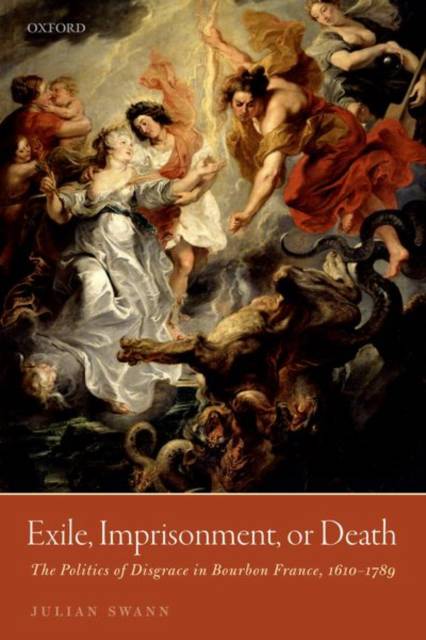
Door een staking bij bpost kan je online bestelling op dit moment iets langer onderweg zijn dan voorzien. Dringend iets nodig? Onze winkels ontvangen jou met open armen!
- Afhalen na 1 uur in een winkel met voorraad
- Gratis thuislevering in België vanaf € 30
- Ruim aanbod met 7 miljoen producten
Door een staking bij bpost kan je online bestelling op dit moment iets langer onderweg zijn dan voorzien. Dringend iets nodig? Onze winkels ontvangen jou met open armen!
- Afhalen na 1 uur in een winkel met voorraad
- Gratis thuislevering in België vanaf € 30
- Ruim aanbod met 7 miljoen producten
Zoeken
Exile, Imprisonment, or Death
The Politics of Disgrace in Bourbon France, 1610-1789
Julian Swann
Paperback | Engels
€ 85,45
+ 170 punten
Uitvoering
Omschrijving
On the accession of Louis XIII in 1610 following the assassination of his father, the Bourbon dynasty stood on unstable foundations. For all of Henri IV's undoubted achievements, he had left his son a realm that was still prey to the ambitions of an aristocracy that possessed independent military force and was prepared to resort to violence and vendetta in order to defend its interests and honour. To establish his personal authority, Louis XIII was forced to resort to conspiracy and murder, and even then his authority was constantly challenged. Yet a little over a century later, as the reign of Louis XIV drew to a close, such disobedience was impossible. Instead, a simple royal command expressing the sovereign's disgrace was sufficient to compel the most powerful men and women in the kingdom to submit to imprisonment or internal exile without a trial or an opportunity to justify their conduct, abandoning their normal lives, leaving families, careers, offices, and possessions behind in obedience to their sovereign. To explain that transformation, this volume examines the development of this new 'politics of disgrace', why it emerged, how it was conceptualised, the conventions that governed its use, and reactions to it, not only from the perspective of the monarch and his noble subjects, but also the great corporations of the realm and the wider public. Although that new model of disgrace proved remarkably successful, influencing the ideas and actions of the dominant social elites, it was nevertheless contested, and the critique of disgrace connects to the second aim of this work, which is to use shifting attitudes to the practice as a means of investigating the nature of Old Regime political culture and some of the dramatic and profound changes it experienced in the years separating Louis XIII's dramatic seizure of power from the French Revolution.
Specificaties
Betrokkenen
- Auteur(s):
- Uitgeverij:
Inhoud
- Aantal bladzijden:
- 560
- Taal:
- Engels
Eigenschappen
- Productcode (EAN):
- 9780198846062
- Verschijningsdatum:
- 8/10/2019
- Uitvoering:
- Paperback
- Formaat:
- Trade paperback (VS)
- Afmetingen:
- 155 mm x 231 mm
- Gewicht:
- 635 g

Alleen bij Standaard Boekhandel
+ 170 punten op je klantenkaart van Standaard Boekhandel
Beoordelingen
We publiceren alleen reviews die voldoen aan de voorwaarden voor reviews. Bekijk onze voorwaarden voor reviews.











